cse15l-lab-reports
CSE 15L Lab 4
Name : Charvi Shukla
Email : cshukla@ucsd.edu
INTRODUCTION
For this lab report I will be running several extra tests on my version of MarkdownParse.java and the one we reviewed in Lab 7.
For Lab 7, my group decided to use my version of MarkdownParse.java to the other group, and the link to that repository can be found here.
The repository that we reviewed was from another group, and the link to that can be found here.
EXPECTED OUTPUT
In order to find the expected output, I will be using the website, commonmark.js dingus. A link to this page can be found here.
- Code Snippet 1
Snippet being used:
`[a link`](url.com)
[another link](`google.com)`
[`cod[e`](google.com)
[`code]`](ucsd.edu)
Expected output:
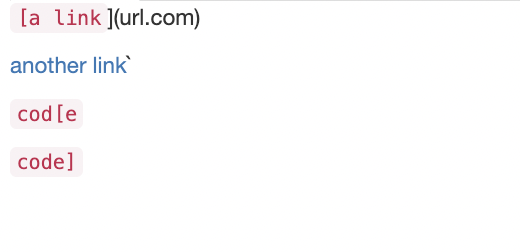
Therefore, since common mark sees “another link”, [google.com] should be in the output.
- Code Snippet 2
Snippet being used:
[a [nested link](a.com)](b.com)
[a nested parenthesized url](a.com(()))
[some escaped \[ brackets \]](example.com)
Expected output:
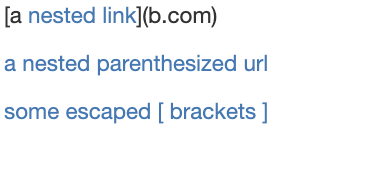
Similarly, here, the output should include the links that commonmark recoginzes. These include [a.com, a.com, example.com]
- Code Snippet 3
Snippet being used:
[this title text is really long and takes up more than
one line
and has some line breaks](
https://www.twitter.com
)
[this title text is really long and takes up more than
one line](
https://sites.google.com/eng.ucsd.edu/cse-15l-spring-2022/schedule
)
[this link doesn't have a closing parenthesis](github.com
And there's still some more text after that.
[this link doesn't have a closing parenthesis for a while](https://cse.ucsd.edu/
Expected output:
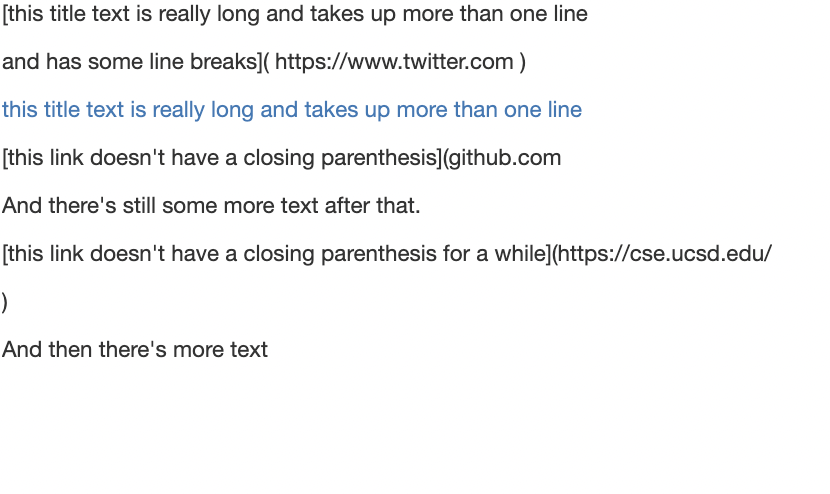
Here, the expected output should include the follwing link: [https://sites.google.com/eng.ucsd.edu/cse-15l-spring-2022/schedule]
ADDING TESTS TO MY REPOSITORY
Now that I have figured out what the expected values would be, I can go ahead and write tests in my version of markdown parse:
I created 3 new .md files: snippet1.md, snippet2.md, and snippet3.md in my MarkdownParser repository.
I then wrote the following tests:
Test 1 screenshot:

Test 2 screenshot:

Test 3 screenshot:

Running the tests: To run these tests, I used the following commands on terminal:
Compiling: javac -cp .:lib/junit-4.13.2.jar:lib/hamcrest-core-1.3.jar MarkdownParseTest.java
Running: java -cp .:lib/junit-4.13.2.jar:lib/hamcrest-core-1.3.jar org.junit.runner.JUnitCore MarkdownParseTest
CORRESPONDING TEST RESULT:
—> All the tests failed
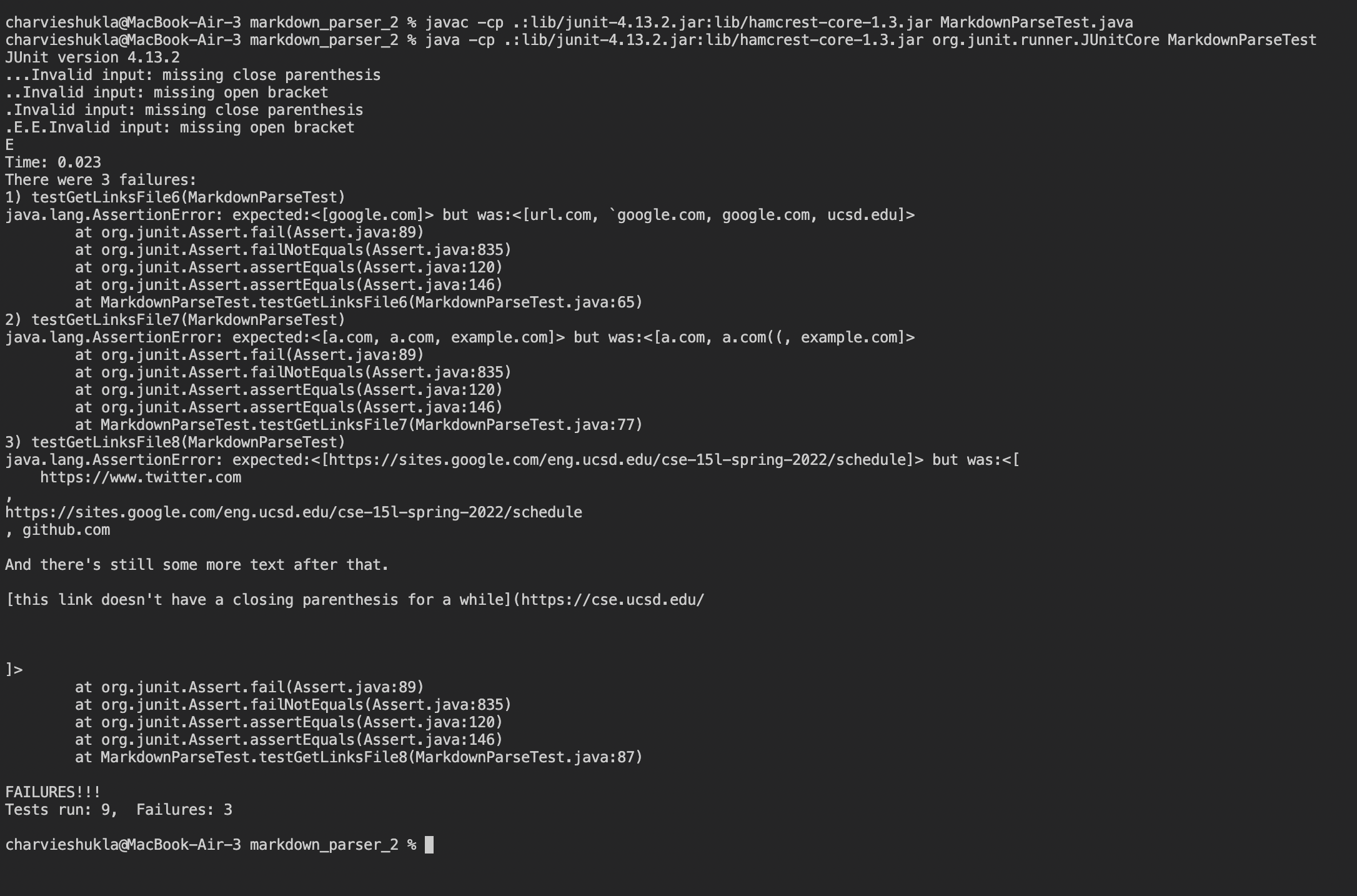
WHERE DID THE TEST FAILIURES OCCUR:
Note: In the code snippets below i have used “. . .” to exclude extra output and only include the relevant parts of the JUnit error message, which would help us find the location of the bug.
Test 1
For the test that contains snippet1.md, the JUnit test result tells us 2 main things: (1) there was a JUnit assertion error on line 89 since expected and actual do not match, (2) there was an error in line 65 of MarkdownParseTest.java which probably caused this error:
1) testGetLinksFile6(MarkdownParseTest)
java.lang.AssertionError: expected:<[google.com]> but was:<[url.com, `google.com, google.com, ucsd.edu]>
at org.junit.Assert.fail(Assert.java:89)
. . .
at MarkdownParseTest.testGetLinksFile6(MarkdownParseTest.java:65)
Test 2
For the test that contains snippet2.md, the JUnit test result tells us 2 main things: (1) there was a JUnit assertion error on line 89 since expected and actual do not match, (2) there was an error in line 77 of MarkdownParseTest.java which probably caused this error:
2) testGetLinksFile7(MarkdownParseTest)
java.lang.AssertionError: expected:<[a.com, a.com, example.com]> but was:<[a.com, a.com((, example.com]>
at org.junit.Assert.fail(Assert.java:89)
. . .
at MarkdownParseTest.testGetLinksFile7(MarkdownParseTest.java:77)
Test 3
For the test that contains snippet3.md, the JUnit test result tells us 2 main things: (1) there was a JUnit assertion error on line 89 since expected and actual do not match, (2) there was an error in line 87 of MarkdownParseTest.java which probably caused this error:
3) testGetLinksFile8(MarkdownParseTest)
java.lang.AssertionError: expected:<[https://sites.google.com/eng.ucsd.edu/cse-15l-spring-2022/schedule]> but was:<[
https://www.twitter.com
,
https://sites.google.com/eng.ucsd.edu/cse-15l-spring-2022/schedule
, github.com
. . .
]>
at org.junit.Assert.fail(Assert.java:89)
at org.junit.Assert.failNotEquals(Assert.java:835)
at org.junit.Assert.assertEquals(Assert.java:120)
at org.junit.Assert.assertEquals(Assert.java:146)
at MarkdownParseTest.testGetLinksFile8(MarkdownParseTest.java:87)
ADDING TESTS TO THE REVIEWED REPOSITORY
Cloning the repository:
First, I cloned the repository that we reviewed in Lab 7 to my computer. I saved it as a directory called MarkdownParser_Review. Then, I added the required code snippets to individual .md files in order to run the tests.
Test 1 screenshot:

Test 2 screenshot:
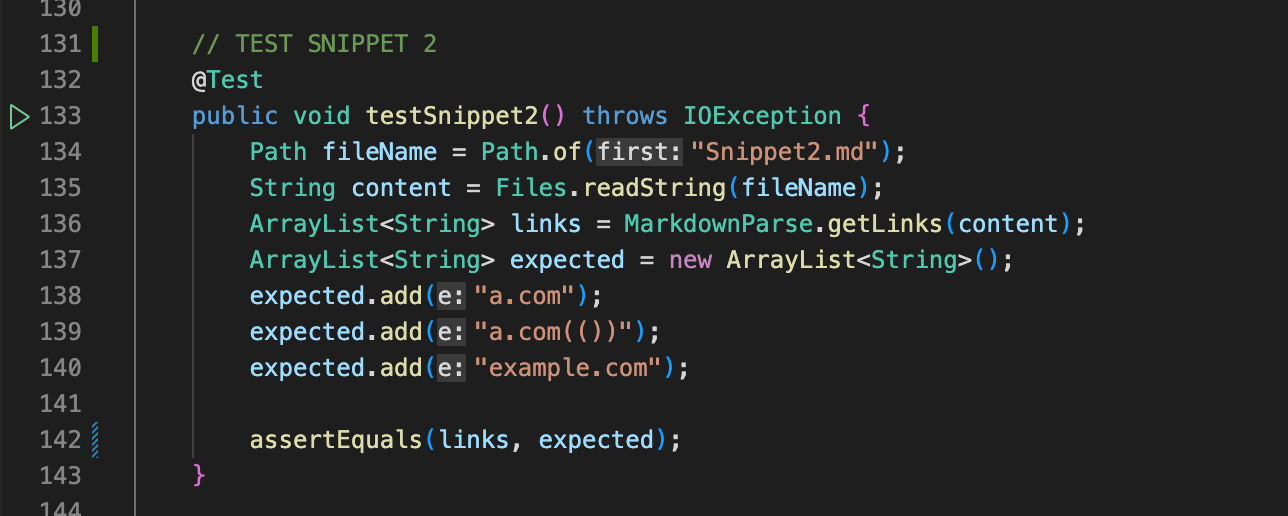
Test 3 screenshot:

CORRESPONDING TEST RESULT:
To run these tests, I used the following commands on terminal:
Compiling: javac -cp .:lib/junit-4.13.2.jar:lib/hamcrest-core-1.3.jar MarkdownParseTest.java
Running: java -cp .:lib/junit-4.13.2.jar:lib/hamcrest-core-1.3.jar org.junit.runner.JUnitCore MarkdownParseTest
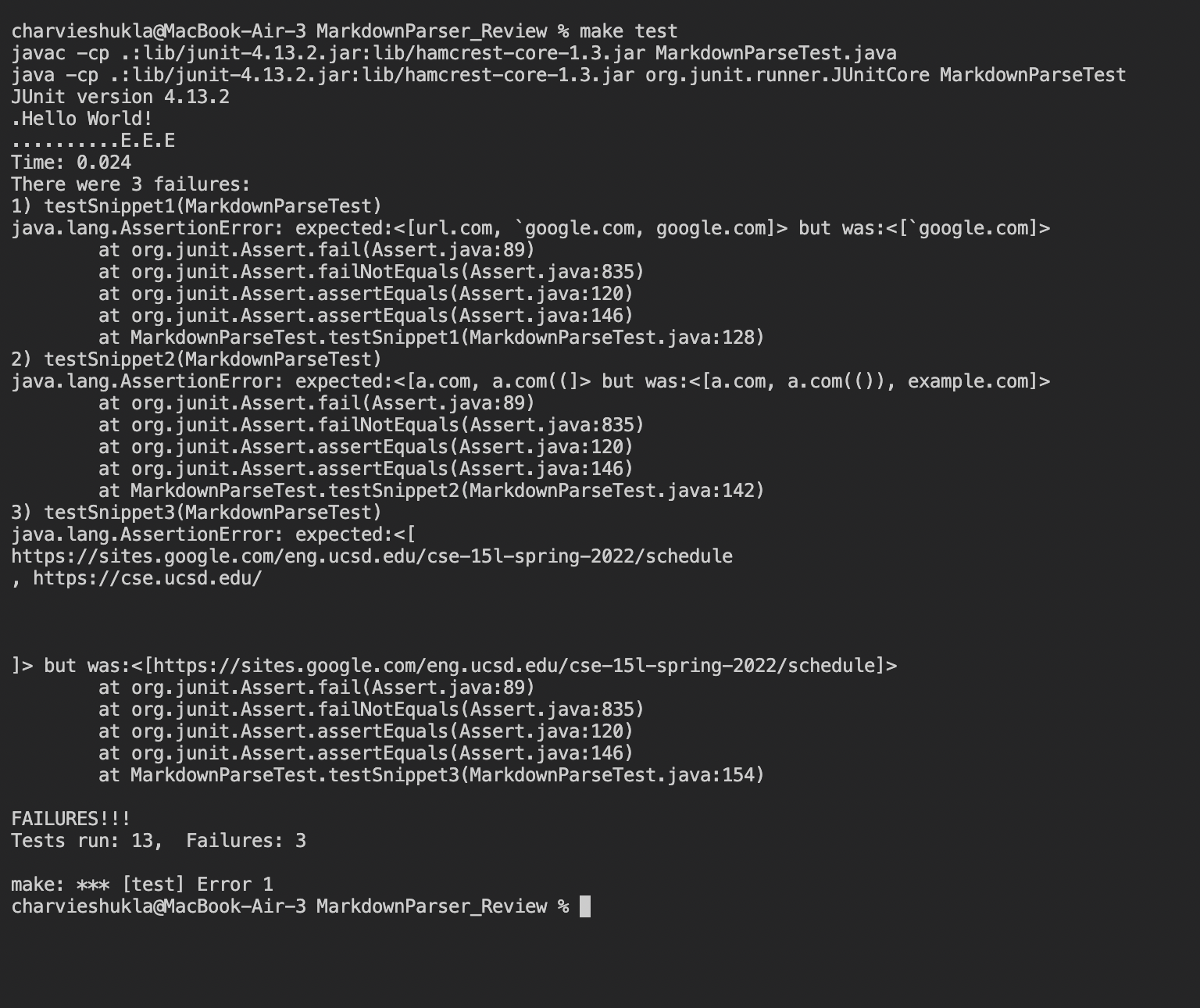
As you can see above, all the tests failed.
WHERE DID THE TEST FAILIURES OCCUR:
Note: In the code snippets below i have used “. . .” to exclude extra output and only include the relevant parts of the JUnit error message, which would help us find the location of the bug.
Test 1
For the test that contains Snippet1.md, the JUnit test result tells us 2 main things: (1) there was a JUnit assertion error on line 89 since expected and actual do not match, (2) there was an error in line 128 of MarkdownParseTest.java which probably caused this error:
1) testSnippet1(MarkdownParseTest)
java.lang.AssertionError: expected:<[url.com, `google.com, google.com]> but was:<[`google.com]>
at org.junit.Assert.fail(Assert.java:89)
. . .
at MarkdownParseTest.testSnippet1(MarkdownParseTest.java:128)
Test 2
For the test that contains Snippet2.md, the JUnit test result tells us 2 main things: (1) there was a JUnit assertion error on line 89 since expected and actual do not match, (2) there was an error in line 142 of MarkdownParseTest.java which probably caused this error:
2) testSnippet2(MarkdownParseTest)
java.lang.AssertionError: expected:<[a.com, a.com((]> but was:<[a.com, a.com(()), example.com]>
at org.junit.Assert.fail(Assert.java:89)
. . .
at MarkdownParseTest.testSnippet2(MarkdownParseTest.java:142)
Test 3
For the test that contains Snippet3.md, the JUnit test result tells us 2 main things: (1) there was a JUnit assertion error on line 89 since expected and actual do not match, (2) there was an error in line 154 of MarkdownParseTest.java which probably caused this error:
3) testSnippet3(MarkdownParseTest)
java.lang.AssertionError: expected:<[
https://sites.google.com/eng.ucsd.edu/cse-15l-spring-2022/schedule
, https://cse.ucsd.edu/
]> but was:<[https://sites.google.com/eng.ucsd.edu/cse-15l-spring-2022/schedule]>
at org.junit.Assert.fail(Assert.java:89)
. . .
at MarkdownParseTest.testSnippet3(MarkdownParseTest.java:154)
ADDITIONAL QUESTIONS
Question 1 Do you think there is a small (<10 lines) code change that will make your program work for snippet 1 and all related cases that use inline code with backticks? If yes, describe the code change. If not, describe why it would be a more involved change.
Yes! A small code change would work in this case. An if statement could be added to the code which would traverse through a line and check if there are any backticks in the line. Since we know a normal link would not every contain a backtick, we can make the code ignore it. This can be achieved in a variety of ways, one of them can be by reading a substring before and after the backtick, ignoring it. Another way can be by reading a string between parenthesis and writing a helper method to detele any backticks in a given substring. This would not require a very involved change and can be achieved by small code edits.
Question 2 Do you think there is a small (<10 lines) code change that will make your program work for snippet 2 and all related cases that nest parentheses, brackets, and escaped brackets? If yes, describe the code change. If not, describe why it would be a more involved change.
No, a small code change would not suffice in this case. To account for nested loops, while traversing through a string we would need to account for the number of open brackets/ parenthesis and their corresponding closed brackets parenthesis. If one of them does not have a complete pair, we would have to account for that as well. Then we would use our normal method to read bewteen the inner most open and closed parenthesis to get the correct output. This is clearly a more involved change since it requires many new local variables, if statements and, potentially some helper methods for convenience.
Question 3 Do you think there is a small (<10 lines) code change that will make your program work for snippet 3 and all related cases that have newlines in brackets and parentheses? If yes, describe the code change. If not, describe why it would be a more involved change.
No, this would also require a more involved change. We can write a boolean helper method to see if for a given line we have all the open and closed parenthesis or not. Then in an if satement, we can include a possibility that the line does not contain all these open/closed brackets and parenthesis. This if statement would then append the current line with the next line so that the formatting is fixed. Then, we can just use our original method to read between the given symbols to extract the link. Since this involves multiple lines [inlculing a whole new helper method], this would be a more involved change.
CONCLUSION
Thank you for reading! :)